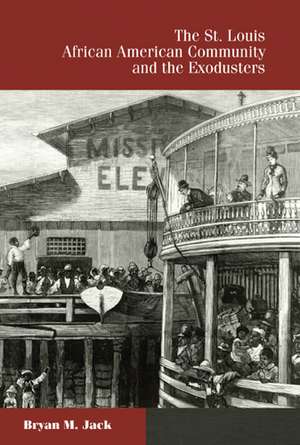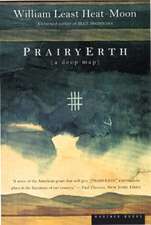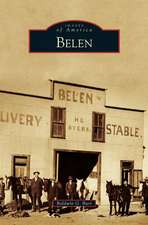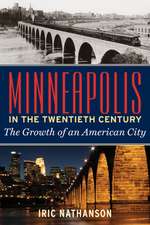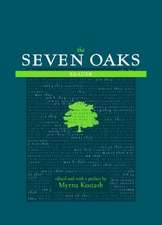The St. Louis African American Community and the Exodusters
Autor Bryan M. Jacken Limba Engleză Hardback – 31 ian 2008 – vârsta ani
In the aftermath of the Civil War, thousands of former slaves made their way from the South to the Kansas plains. Called “Exodusters,” they were searching for their own promised land. Bryan Jack now tells the story of this American exodus as it played out in St. Louis, a key stop in the journey west.
Many of the Exodusters landed on the St. Louis levee destitute, appearing more as refugees than as homesteaders, and city officials refused aid for fear of encouraging more migrants. To the stranded Exodusters, St. Louis became a barrier as formidable as the Red Sea, and Jack tells how the city’s African American community organized relief in response to this crisis and provided the migrants with funds to continue their journey.
The St. Louis African American Community and the Exodusters tells of former slaves such as George Rogers and Jacob Stevens, who fled violence and intimidation in Louisiana and Mississippi. It documents the efforts of individuals in St. Louis, such as Charlton Tandy, Moses Dickson, and Rev. John Turner, who reached out to help them. But it also shows that black aid to the Exodusters was more than charity. Jack argues that community support was a form of collective resistance to white supremacy and segregation as well as a statement for freedom and self-direction—reflecting an understanding that if the Exodusters’ right to freedom of movement was limited, so would be the rights of all African Americans. He also discusses divisions within the African American community and among its leaders regarding the nature of aid and even whether it should be provided.
In telling of the community’s efforts—a commitment to civil rights that had started well before the Civil War—Jack provides a more complete picture of St. Louis as a city, of Missouri as a state, and of African American life in an era of dramatic change. Blending African American, southern, western, and labor history, The St. Louis African American Community and the Exodusters offers an important new lens for exploring the complex racial relationships that existed within post-Reconstruction America.
Many of the Exodusters landed on the St. Louis levee destitute, appearing more as refugees than as homesteaders, and city officials refused aid for fear of encouraging more migrants. To the stranded Exodusters, St. Louis became a barrier as formidable as the Red Sea, and Jack tells how the city’s African American community organized relief in response to this crisis and provided the migrants with funds to continue their journey.
The St. Louis African American Community and the Exodusters tells of former slaves such as George Rogers and Jacob Stevens, who fled violence and intimidation in Louisiana and Mississippi. It documents the efforts of individuals in St. Louis, such as Charlton Tandy, Moses Dickson, and Rev. John Turner, who reached out to help them. But it also shows that black aid to the Exodusters was more than charity. Jack argues that community support was a form of collective resistance to white supremacy and segregation as well as a statement for freedom and self-direction—reflecting an understanding that if the Exodusters’ right to freedom of movement was limited, so would be the rights of all African Americans. He also discusses divisions within the African American community and among its leaders regarding the nature of aid and even whether it should be provided.
In telling of the community’s efforts—a commitment to civil rights that had started well before the Civil War—Jack provides a more complete picture of St. Louis as a city, of Missouri as a state, and of African American life in an era of dramatic change. Blending African American, southern, western, and labor history, The St. Louis African American Community and the Exodusters offers an important new lens for exploring the complex racial relationships that existed within post-Reconstruction America.
Preț: 373.95 lei
Nou
Puncte Express: 561
Preț estimativ în valută:
71.55€ • 74.71$ • 59.09£
71.55€ • 74.71$ • 59.09£
Carte tipărită la comandă
Livrare economică 15-29 aprilie
Preluare comenzi: 021 569.72.76
Specificații
ISBN-13: 9780826217721
ISBN-10: 0826217729
Pagini: 192
Ilustrații: 1 illus.
Dimensiuni: 152 x 229 x 20 mm
Greutate: 0.43 kg
Ediția:First Edition
Editura: University of Missouri Press
Colecția University of Missouri
ISBN-10: 0826217729
Pagini: 192
Ilustrații: 1 illus.
Dimensiuni: 152 x 229 x 20 mm
Greutate: 0.43 kg
Ediția:First Edition
Editura: University of Missouri Press
Colecția University of Missouri
Recenzii
"Jack does an excellent job of outlining one of the most important events in American history."—The North Carolina Historical Review
Notă biografică
Bryan Jack is Associate Professor of History at Southern Illinois University Edwardsville, where he teaches African American history and is director of SIUE’s Universities Studying Slavery initiative. He received his BA from Baker University, MA from the University of Alabama, and Ph.D. from Saint Louis University. He is the editor of the book Southern History on Screen (University Press of Kentucky, 2018) and his scholarship has appeared in the journals: The Confluence, Americana, The Griot, The Councilor, The Journal of American Studies of Turkey, and U.S. Studies Online. He and his wife Jenny live in the city of St. Louis, Missouri.
Descriere
For many Exodusters, former slaves who made their way from the South to the Kansas plains in the aftermath of the Civil War, St. Louis was a key stop in the journey west. However, many landed on the St. Louis levee destitute, and city officials refused aid for fear of encouraging more migrants. Bryan Jack tells how the city’s African American community organized relief in response to this crisis, but he also shows that black aid to the Exodusters was more than charity—community support was a form of collective resistance to white supremacy and segregation as well as a statement for freedom and self-direction. The St. Louis African American community understood that if the Exodusters’ right to freedom of movement was limited, so would be the rights of all African Americans. He also discusses divisions within that community and among its leaders regarding the nature of aid and even whether it should be provided.
